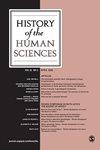诺伯特·埃利亚斯社会学中的宗教与文明:长期视角下的幻想与现实平衡
IF 0.5
2区 历史学
Q2 HISTORY & PHILOSOPHY OF SCIENCE
引用次数: 0
摘要
许多社会学家都注意到,在埃利亚斯对欧洲文明进程的调查中,令人费解的是,没有对宗教进行详细的讨论。埃利亚斯没有发展宗教社会学,但他没有忽视信仰在人类社会史上“精神世界”的重要性。在他的著作中,这种信念被描述为幻想图像,可以与“现实一致”的知识主张形成对比。埃利亚斯将幻想与现实的平衡,无论是宗教的还是世俗的,置于分析社会如何应对在很大程度上不受控制的条件下产生的集体恐惧的中心。他将宗教取向定位在一个更广泛的分析框架内,该框架涉及第一批人类群体和当前国家组织社会中幻想与现实的平衡。埃利亚斯强调,随着自然科学的兴起,“文明”社会的平衡发生了怎样的变化。但他的作品强调了幻想形象在技术复杂的社会中的持续影响,特别是在国家和国际权力斗争的背景下。他对幻想图像如何在恐惧的条件下获得相当大的影响的分析,对于研究包括气候变化在内的全球挑战的社会反应很重要。与韦伯的宗教社会学的联系为在一个动荡和不可预测的时代对幻想和现实一致性之间的平衡进行理论上知情的实证研究指明了道路。本文章由计算机程序翻译,如有差异,请以英文原文为准。
Religion and civilization in the sociology of Norbert Elias: Fantasy–reality balances in long-term perspective
Many sociologists have drawn attention to the puzzling absence of a detailed discussion of religion in Elias’s investigation of the European civilizing process. Elias did not develop a sociology of religion, but he did not overlook the importance of beliefs in the ‘spirit world’ in the history of human societies. In his writings such convictions were described as fantasy images that could be contrasted with ‘reality-congruent’ knowledge claims. Elias placed fantasy–reality balances, whether religious or secular, at the centre of the analysis of how societies have dealt with collective fears that arise in response to largely uncontrolled conditions. He located religious orientations within a broader framework of analysis regarding fantasy–reality balances in the first human groups and in current state-organized societies. Elias stressed how balances changed in ‘civilized’ societies with the rise of the natural sciences. But his writings emphasized the continuing influence of fantasy images in technologically sophisticated societies, particularly in the context of national and international power struggles. His analysis of how fantasy images acquired considerable influence under conditions of fear is important for studies of social responses to global challenges including climate change. Connections with Weber’s sociology of religion point the way to theoretically informed empirical research on balances between fantasy and reality-congruence in a tumultuous and unpredictable era.
求助全文
通过发布文献求助,成功后即可免费获取论文全文。
去求助
来源期刊

History of the Human Sciences
综合性期刊-科学史与科学哲学
CiteScore
1.60
自引率
11.10%
发文量
31
审稿时长
>12 weeks
期刊介绍:
History of the Human Sciences aims to expand our understanding of the human world through a broad interdisciplinary approach. The journal will bring you critical articles from sociology, psychology, anthropology and politics, and link their interests with those of philosophy, literary criticism, art history, linguistics, psychoanalysis, aesthetics and law.
 求助内容:
求助内容: 应助结果提醒方式:
应助结果提醒方式:


